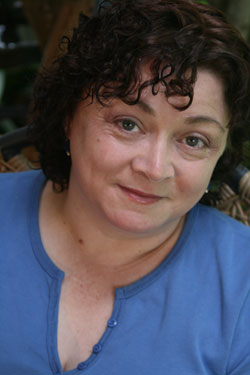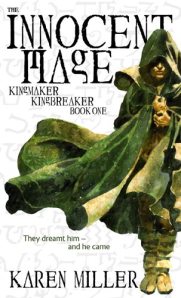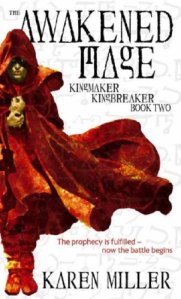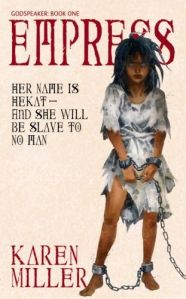First off, welcome to the South African SFF-reading public, Karen, and thank you for doing this interview! 🙂
A: Thanks so much for asking me! I’m told you’ve got a vibrant and enthusiastic SFF fan base in lovely South Africa, and I’m thrilled to be a small part of it.
Would you please tell us a bit about yourself?
A: Well, I’m a hybrid Australian/Canadian/Brit, so solid gold Commonwealth all the way through. Born in Vancouver, you see, with an Oz father and a Brit mother. Only child. Living in Sydney. Writing full-time, after years of bouncing around in various jobs. I worked with horses professionally, in customer service, in publishing, in local government as a PR officer, I was a college lecturer in English and Business Communications and had my own sff/mystery bookshop for six years, before selling my first fantasy novels. I’ve got a BA in Communications and an MA in Children’s Literature. I act and direct at my local community theatre. I’ve written a children’s play, and had it performed professionally in New Zealand. Right now my life is consumed by various book deadlines, so I’m very very boring. J
You’ve completed your Kingmaker, Kingbreaker (though, as I understand it, you’re not finished with it yet. :-)) series and the first novel in your Godspeaker series is selling all over the world: can you please give us introductions of both series’ for those readers who have not yet picked up your books?
A: No, the KK series isn’t finished yet. I’m just about to start on the first of a two-part sequel, which will be followed up by a standalone prequel, and then the story will be told. The Godspeaker trilogy is a complete story … but there is one character in it whose life might be looked at in more detail sometime down the track. I ended up becoming very fond of and intrigued by him.
The Kingmaker, Kingbreaker duology (The Innocent Mage/Innocence Lost aka The Awakened Mage) is the story of two men from very different worlds, who become friends and join forces to defeat a terrible evil that’s been secretly hanging over their idyllic kingdom for hundreds of years. Asher, the youngest in a large family of fishermen, realises he’s got little future where he is, so he travels to the kingdom’s capital to find work and raise enough money to strike out on his own. In doing so, he crosses paths with the king’s son, who is in his own way as much of an outsider as Asher. Gar’s people have a monopoly on magic, and the king wields the most important magic of all, that keeps the kingdom isolated and safe. But Gar is crippled, and can’t do magic, so he has more in common with Asher than with his own people. Complicating matters is the fact that a clandestine group of people have been watching for Asher’s arrival for centuries, since they believe he’s the key to saving the kingdom from the evil that’s waiting to engulf them. All these lives tangle up with each other, leading to a great deal of drama.
As for the sequel, I ain’t telling! J
The Godspeaker trilogy is set in a completely different world. Bk 1, Empress aka Empress of Mijak, is the story of one powerless girl’s journey to adulthood and unparalleled power … and how that power changes her, and the world she inhabits. It’s also the story of her best friend, a fellow former slave, and how important he is to both her, and world events, and her sons, who struggle with having her as a mother. It’s the story of Hekat, who’ll not be ruled by anyone but her dark god. Bk 2, The Riven Kingdom, takes the reader to a new country, Ethrea, where another young woman, Rhian, is also faced with harsh choices regarding her future and her birthright … and where an important character from Bk 1 becomes an integral part of her life as she battles her church and secular enemies to secure the crown that is rightfully hers. Bk 3, The Hammer of God, sees Rhian struggling to maintain control and deal with the looming threat presented by Hekat and her all-conquering army. Rhian and her people are all that stand between Hekat and the world’s destruction … but Ethrea has so many troubles of its own.
Also, since I’m not sure if you’re aware of it, I’ll shamelessly mention that I’ve got a new series that’s already started releasing in Australia, and is coming out elsewhere in the English-speaking world in Jan 09, under the pen name K. E. Mills. That’s the Rogue Agent series. It’s fantasy too, but it’s a series of stand-alone adventures with continuing characters, and it’s set against a slightly more modern background than my other work. Think the flavour of late Victorian/early Edwardian England. I’m just polishing Bk 2 now. Bk 1, The Accidental Sorcerer, tells the story of a hapless young wizard named Gerald Dunwoody who can’t manage to keep a job. After his most recent career disaster he takes a position as royal court wizard to a foreign king … and very soon realises he’s jumped from the frying pan into an inferno. His best friends are an ensorcelled bird named Reg and a genius wizard named Monk, and when he teams up with the king’s overworked sister Melissande, in an attempt to avert a war, his life takes some very interesting turns.
What were the themes that you wanted to explore with Kingmaker, Kingbreaker and Godspeaker?
A: In the KK series, I’m exploring the themes of friendship, betrayal, loss and sacrifice. Of secrets, and the damage they can do even when they’re necessary. In the Godspeaker trilogy, I’m dealing with the impact of religion on a culture, and how belief can be a power for good, and for evil. I’m looking at how people without power can react to getting power, how power can be used and abused, how people with power can be warped or enriched by it. I’m also looking at the power of family, how at the end of the day — no matter how much worldly power we may or may not wield — so often it comes down to who we love, and how we are loved, and what we do with the love that’s inside us. And I’ll add, still shamelessly plugging J that in the Rogue Agent series I also examine friendship, and loyalty, and power, and how doing the right thing often isn’t the same as doing the easy thing … and how good people sometimes do bad things for the greater good, and how that changes them and the world they live in and the people they care about.
What have you found to be the best way of relaxing during or between projects? Have you ever wanted to just pull your hair out and demand more hours in the day from the universe? 🙂
A: Right now, there’s not a whole lot of time between projects! Mainly because things kind of snowballed in a major way and I find myself surrounded by various deadlines. So the free time thing is a bit moot just now. I read outside the genre, in mystery and crime mainly, to rest my brain, and I watch a lot of TV drama on DVD. I’d go mad without getting my regular story fix, but after a day full of words I find reading quite hard. So, like I say, I catch up on performance drama instead and a smidgen of reality TV. Dexter, Deadwood, Criminal Minds, The West Wing, Stargate Atlantis, Battlestar Galactica, NCIS, Numbers, Top Chef, Project Runway, Master Chef, The Closer … just a few off the top of my head. J
You did some German longsword training a while back; how did that go? 🙂
A: I loved it. I had to stop, because on top of all the work I was directing a play earlier this year and something had to give. I hope to get back to it from scratch next year, because it was a lot of fun and useful for the work, as well.
With such an explosion of authors coming out of Australia (both in SFF and out of it), what do you think contributed to putting Australian authors on the map?
A: I honestly don’t know for sure. I mean, I think we’ve always had talent; it was just a question of getting noticed outside our own very small pond. And thanks to the great work from HarperCollins Voyager in Australia in putting our books in front of foreign publishers, the markets in other countries, especially the UK and the US, have seen that our stories translate well into their cultures.
It also helps that the overseas publishers, like Orbit (my UK/US publisher) have been so willing to give outsiders a go. I mean, at the end of the day the only thing that matters is the story — where it comes from isn’t the point — but still, publishing is a competitive business and choosing foreign over homegrown authors can ruffle feathers. I know how much it means to me that my work was selected by an overseas publisher to reach a wider world audience — and I think other Aussie authors feel the same way. Very blessed.
I mean, Australia’s a funny place. Like America, we were a British colony, so there’s that link between our three nations. And even though we’re still part of the commonwealth we’re very independent. We’re a pushy nation that runs around the world all over the place having a go at things. Every time you turn around you’ll find an Aussie, in just about every country you can think of. We’re there. And we’re pretty easy to get along with, on the whole. So there’s a freshness and a courage and a sense of humour in our outlook that I think comes through in the work. We’re young and we’re feisty and we have an energy in our national psyche that perhaps informs our writing, too. That’s all I can think of!
You’ve been on many book tours and have had to sign many books: is there any tour that stands out in particular, one that you really enjoyed?
Well, I honestly haven’t done that many … *g* but wherever I go, I just like talking to readers. That’s the buzz for me. There are so many, many wonderful books out there to read. I mean, if it’s a signing for me, well, I sign my books, but I love to talk about the books that I love, the authors that I love. The best thing about being a reader is that you can read many many many more books in a year than any one author can write. So you’re spoiled for choice. And sharing my love of reading with other readers is the best thing of all, and that’s what getting out to signings and conventions gives me a chance to do.
With fantasy changing as a genre and the emphasis turning to grittier, un-formulaic storylines, what do you feel began this shift, and do you see it as a good or a bad thing?
I don’t know that it’s changing, as such. I might say that it’s expanding. The tent is getting bigger, which means there’s much more room for different flavours of fantasy — and I say that’s a great thing. If you go back a few years, to the early explosion of fantasy fiction, when the most prominent names were David Eddings and Terry Brooks and Raymond Feist, leading on from the Tolkien style of fiction, basically you were looking at epic heroic storytelling and that seemed to define the genre. Not that I would describe those authors as being formulaic — I think they were the early explorers of the field, laying down the groundwork that then allowed other writers to come along after them and push the boundaries.
And while some authors continue to work in the epic heroic field — George RR Martin and Brian Ruckley, for example, with Brandon Sanderson and Patrick Rothfuss as well — you’ve also got writers like Robin Hobb, who writes uniquely personal fantasy set against wide cultural backdrops, and Kate Elliott, who certainly writes epic fantasy but without the same emphasis on bloody battles, and KJ Parker, who again keeps things character-driven, as does Glenda Larke. And then you look at the explosion of urban fantasy, which is largely driven by female authors and a female readership, in which the central characters are women. I think that’s been an important development, because for so long women haven’t had a strong voice in speculative fiction. Even now, far more men are writing the epic heroic stuff, perhaps because there’s a mistaken assumption that women either don’t like or can’t write the tough battle stuff, the violence. Which makes me laugh, really, because some of those urban fantasies don’t pull any punches at all.
Standing back from that, I think there’s certainly been a shift with regards to grittiness, and I think that reflects the times we live in, which are for many of us darker and more dangerous than our remembered childhoods. As an example, I’d point to the difference between the original Battlestar Galactica series, and Ronald D Moore’s (in my opinion, brilliantly) re-imagined version that’s currently screening. The original BSG seems fluffy and insubstantial, compared to the updated series. But that reflects a change in cultural mood, I think. And possibly the same thing has happened in the literary world. Readers are demanding, and enjoying, more politically and culturally complex works. Not everything that’s being published is that complex, of course, some stuff out there is just a damned good romp. But that’s wonderful, and that’s what I’m happy about. Like I say, the tent has grown bigger and there’s room for everyone. The only danger I see is that publishers, needing to make money, might make the mistake of focusing only on one flavour of fantasy … and when tastes shift again, as they will, they always do, publishing is cyclical, if they’ve not been clever they’ll not have enough books of a different flavour to keep the machine moving.
At the end of the day, if you tell a great story honestly, with passion, I believe it’ll find a home. Provided we remember to honour and respect all the flavours of the fantasy genre, and their readers, I think our chosen field of fiction will continue to prosper and grow.
Finally, how it felt to have been called up and asked to contribute to A Galaxy Far, Far Away?
A: To say that I am humbled, awed and terrified to be writing in the Star Wars universe is about the biggest understatement of the year. I saw the original Star Wars at the movies, in 1977. I was still in high school, and a firm geeky sci-fi fan. All these years later I still remember the feeling of seeing the rebel ship, then the Star Destroyer, flying over our heads. I think I knew, on some deep level, that I’d just seen something very important. And, in all seriousness, the film changed my life. The people I met, the things I did, the dreams I pursued, because of Star Wars, have shaped me and influenced me and truly blessed me. And now I’ve been given this incredible chance to play in that world, to play with those characters … I’m beside myself. Terrified, as I say, because as a fan myself I know just how passionate and dedicated and protective fans are about Star Wars. But so happy. Especially since I’m playing in the prequel era, and I really love that era. I love the nobility and the tragedy and angst and the foreshadowed doom of the last days … which probably says I’m a whacko broad, but there you are. J I know there are people who love to groan and complain about the prequel films, but I honestly enjoy them. There’s so much wonderful character work in there. To me, they’ve been a great gift. I can only hope that the stories I’m telling do justice to the world that George Lucas created, and gave us.
Thank you, Karen, for giving up some of your time for this interview, and for the wonderful worlds and characters you’ve taken us too and shared with us! 🙂
A: You’re more than welcome. Thanks to you, and to the readers, without whom I wouldn’t get to be having so much fun.





Liz
September 12, 2008 at 3:34 pm
What an absolutely awesome interview. I love Karen! Thanks bunches for posting it.
Liz x
Julia
September 22, 2008 at 10:13 pm
Thats great interview. I am glad to find this page.
Daya
September 25, 2008 at 2:16 pm
Amazing interview! I loved the Kingmaker, Kingbreaker series and am looking forward to reading the Godspeaker trilogy.